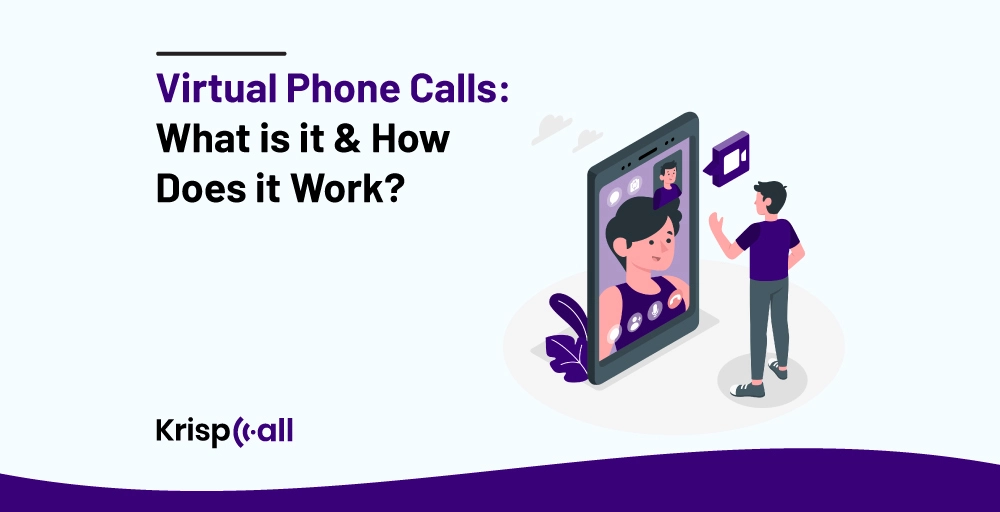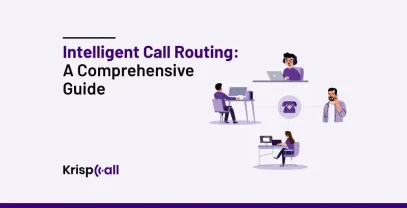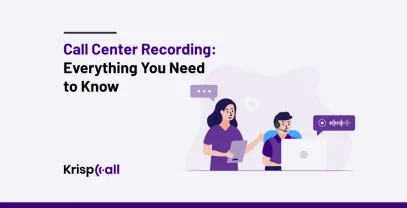Are you still spending a handsome sum of money while making long-distance phone calls using a traditional telephone line?
Then, get rid of your outdated phone network and replace it with VoIP technology to begin making virtual phone calls.
A virtual phone call has completely transformed the way businesses and individuals connect. It has unleashed a wave of possibilities for individuals and businesses alike. It’s like a breath of fresh air, enabling enhanced flexibility, seamless collaboration, and massive cost savings.
But that’s not it. There are many other fascinating attributes of VoIP calls. And if you want to get more details, continue reading this blog till the end.
In this blog post, we will delve into the various aspects of a cloud-based VoIP call, including its meaning, how it works, and its benefits.
What is a Virtual Phone Call?
A virtual phone call refers to a telephone conversation between two persons that takes place over the Internet rather than a traditional phone network. It is also known as VoIP (Voice over Internet Protocol) calls. Virtual phone calls are usually made through the VoIP phone system and online phone calling apps.

Many businesses leverage VoIP/ virtual phone systems from various service providers like KrispCall, RingCentral, Nextiva, etc., to make it easy for their employees to make and receive calls through any device and from anywhere via an internet connection, packed with advanced features like call recording, call monitoring, conference calling, call routing, etc.
Likewise, you can also make virtual phone calls through online calling apps like Skype, Zoom, Google Meet, Microsoft Teams, etc. But your device must be connected to WiFi to make virtual phone calls.
VoIP calls are becoming increasingly popular due to their cost-effectiveness, flexibility, and advanced features and functionalities.
How Does Virtual Phone Calls Work?
Virtual phone calls operate through the utilization of VoIP (Voice over Internet Protocol) technology. VoIP converts voice signals into data packets, which are then transmitted over the internet. This technology enables people to make and receive phone calls using devices like smartphones, computers, and tablets.
During a phone call, your voice is transformed into data packets on your device. These packets are then sent over the internet to the person you’re calling. At their end, the data packets are converted back into voice signals so that they can hear you. This entire process occurs in real-time, ensuring no delays during the call.
Here’s a detailed step-by-step explanation of how virtual phone calls work;
- You use a VoIP app on your device to dial a phone number.
- The VoIP app sends your call request to the phone service provider.
- The virtual phone service provider directs your call to the recipient’s device.
- Your audio signals get converted into data packets and are transmitted over the internet between your device and the recipient’s device.
- The data packets are converted back into audio signals at the recipient’s device, allowing them to hear you.
🔍 Read also: How to Get More Phone Calls from your Website?
What are the Benefits of Virtual Phone Calls?
Virtual phone calls have several benefits, which are as follows:
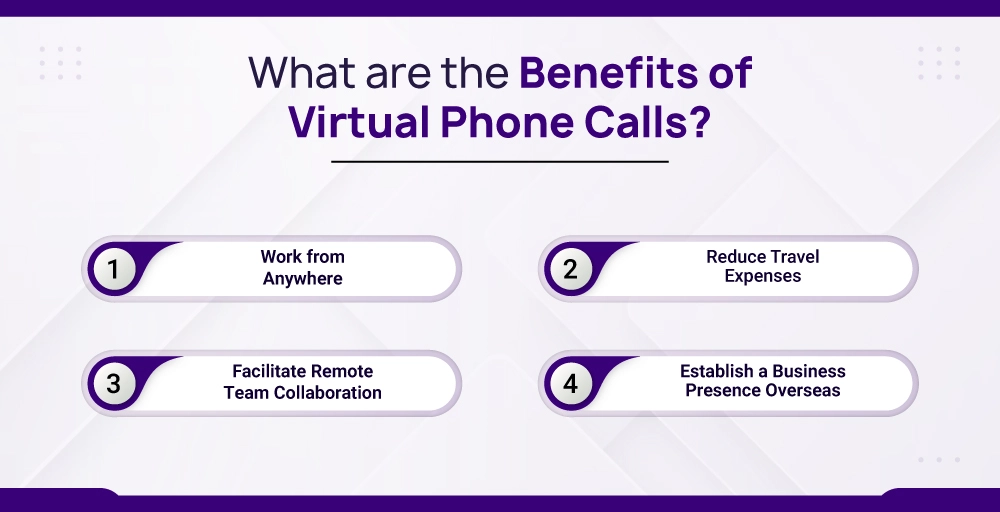
1. Work from Anywhere
Virtual phone calls can be made and received from any part of the world via devices connected to the internet. As a result, you can work from anywhere and get in touch with your clients and teams, regardless of your physical location. This flexibility is beneficial for freelancers and businesses having geographically dispersed teams.
2. Reduce Travel Expenses
Traveling for work is expensive, and it’s not just the flights. It’s the hotels, the meals, and everything else that goes with it. Instead of going through the hassle of physically traveling to another location to meet with clients, you can simply make a virtual phone call. Even if you’re miles away or in a different country, virtual phone calls enable seamless collaboration between you and your clients remotely.
3. Facilitate Remote Team Collaboration
Virtual phone systems offer additional collaboration features like file sharing, screen sharing, and instant messaging with devices like mobile, computers, and laptops. Using devices like make phone call from computer with VoIP apps installation. These features enable team members to engage in real-time discussions, share screens, and work together on projects regardless of where they’re located. Furthermore, one virtual number can be used across devices, simplifying collaboration within the team.
4. Establish a Business Presence Overseas
With the help of phone numbers and VoIP services, businesses can establish a local presence in different regions without the need for physical offices. It is beneficial for companies looking to connect with potential customers overseas.
What are the main reasons Businesses switching Virtual Phone Calls?
Below are some of the factors that drive businesses to switch to virtual phone calls:
- Cost saving: Virtual phone calls are usually a cheaper option than a traditional telephone service, especially when it comes to long-distance and international calls.
- Flexibility: Businesses can make and receive virtual phone calls from anywhere in the world as long as they have an internet connection.
Mobility: Since virtual phone calls are independent of traditional phone lines, businesses no longer have to worry about missing important calls while traveling.
Choosing the Best Virtual Phone Call Service Provider
Below is the overview of the best three virtual phone call service providers:
1. KrispCall
KrispCall is the most reliable and trustworthy virtual phone call service provider that provides virtual phone numbers for over 100+ countries at an affordable cost. One of the standout features of KrispCall is its unified callbox feature that allows you to view all your messages and call history within a single dashboard.
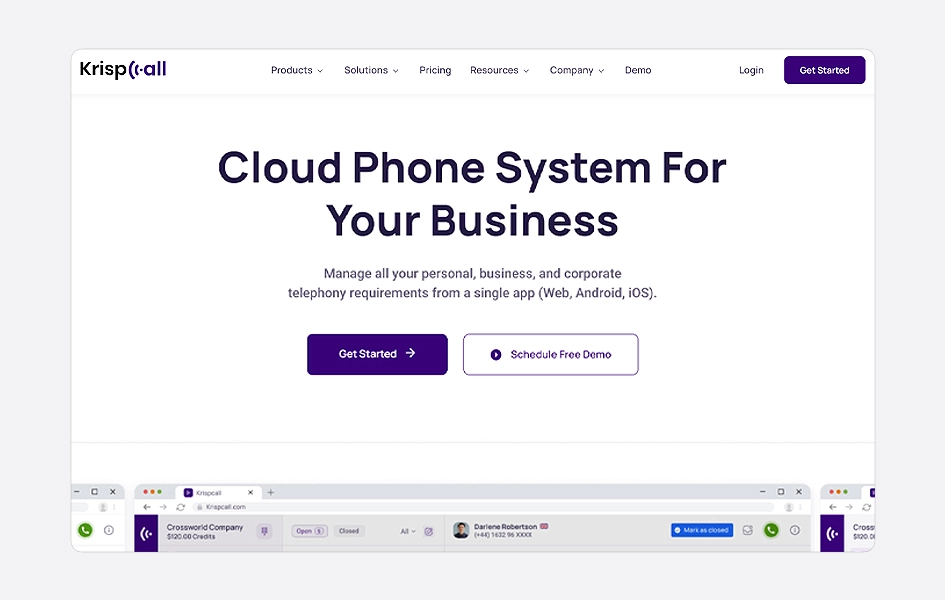
Besides this, it offers a wide range of features suitable for businesses of all sizes, like call forwarding, voicemail, shared number, caller ID, etc. Hence, leveraging KrispCall’s virtual number helps businesses save money, improve productivity, and enhance customer service.
Features:
- Unified callbox
- Call monitoring
- Call history
- Caller ID
Pros:
Excellent customer support.
Affordable.
Cons:
- The desktop app is unavailable.
- Limited integration option.
Pricing:
- Essential: $15/user/month
- Standard: $40/user/month
- Enterprise: Custom
2. Nextiva
Nextiva is another provider of virtual phone call services well-known for its performance, advanced features, and user-friendly interface. It offers businesses of all sizes a flexible and cost-effective communication solution that caters to their requirements.
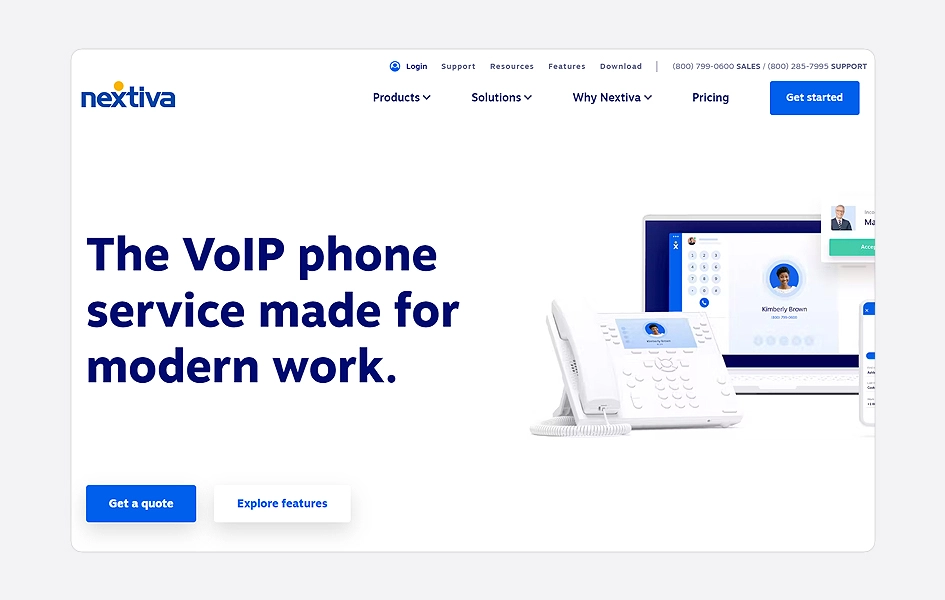
With all the innovative features Nextiva has, companies can do more than just answer calls. Companies can make an impact in different regions and effortlessly manage virtual calls using functions like call forwarding and routing. Moreover, the platform enables collaboration among team members, integrates smoothly with CRM systems, and provides insights into call volumes and customer interactions.
Features:
- Video conferencing
- Unified communication
- Call recording
- Call analytics and reporting
Pros:
- Good customer support.
- User-friendly dashboard.
Cons:
- Expensive.
- Issues in the mobile app.
Pricing:
- Essential: $22.95/user/month
- Professional: $30.95/user/month
- Enterprise:$40.95/user/month
3. RingCentral
Another name on the list is RingCentral. It offers a range of communication and collaboration tools that are suitable for businesses of all sizes. Their omnichannel communication platform seamlessly integrates voice, video, messaging, and emails to provide a seamless customer experience.
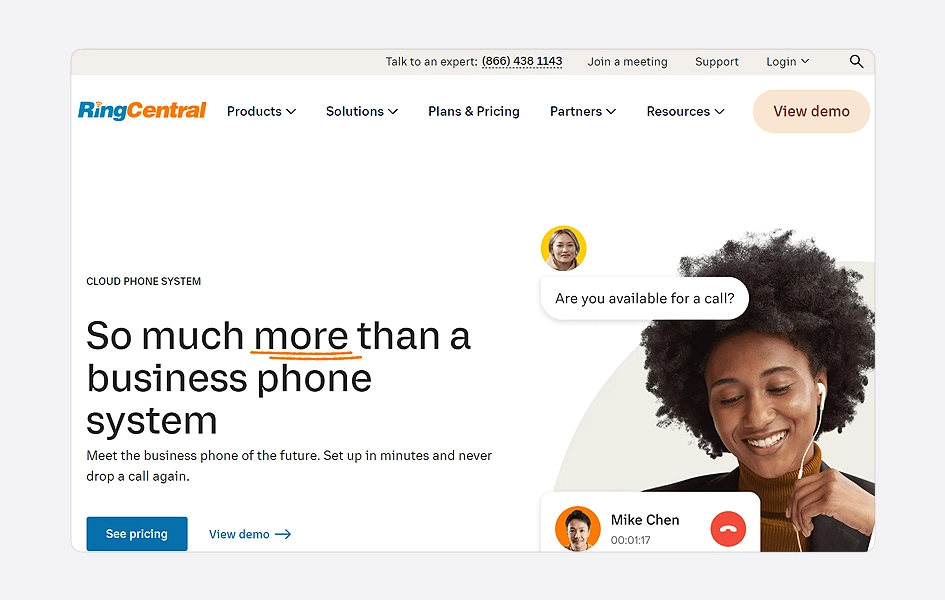
What makes RingCentral unique is its integration capability. It seamlessly connects with business applications such as Microsoft Teams, Google Workspace, Salesforce, Slack, Zoho, and more. This integration, paired with call analytics and reporting, makes it easy for sales and support teams to improve efficiency and productivity.
Features:
- Voicemail-to-email
- Call screening
- Call forwarding
- Live transcription
Pros:
- 99.999% uptime.
- 11+ 3rd party compliant certifications.
Cons:
- Limited customization option.
- Difficult to navigate in the admin portal.
Pricing:
- Core: $30/month/user
- Advanced: $35/month/user
- Ultra: $45/month/user
Tabular Comparison
Here is the comparison of these providers on various aspects:
| Parameter | KrispCall | Nextiva | RingCentral |
| Pricing | Starts from $15 per user per month. | Starts from $22.95 per user per month. | Starts from $35 per user per month. |
| Best for | Best for small to large organizations that need virtual phone service at an affordable cost with a wide range of features. | Best for mid to large-scale organizations that need virtual phone service with a user-friendly dashboard and integration options. | Best for large-scale organizations that have a set budget of more than $35 per month and need a unified communication platform feature. |
| Customer support | Excellent customer support with 24/7 live support via phone calls, chats, and emails. | Good customer support with 24/7 availability via calls and online chat. | Good customer support with 24/7 availability via calls and live chat. |
| Features | Unified callbox, caller ID, call monitoring, shared number, number porting, etc. | Auto-attendant, call recording, video conferencing, voicemail transcription, call routing, etc. | Automatic call recording, voicemail-to-email, omnichannel communication platform, call screening, call park, etc. |
Features to Consider When Choosing A Virtual Phone Service
Some common features to consider when choosing a virtual phone service include:
- Call Recording: This feature lets you record live phone calls for future reference.
- Unlimited Calling: It enables you to make as many phone calls as you want without charging extra money.
- Call Forwarding: This feature allows you to forward calls to another phone and mobile number.
- Call Routing: You can route incoming phone calls to a specific department or person based on pre-established rules and criteria.
- Call analytics and reporting: You can use this feature to track performance, measure productivity, and identify areas where you can improve.
✌️ You May Also Like: How to get a Virtual Phone Number for WhatsApp Business in 2023
Conclusion
To conclude, a virtual phone call is a modern way to make a call without being limited to a specific location and long telephone wires. Making phone calls using virtual technology has several benefits, such as the flexibility to make and receive phone calls from any device (mobile, computer, laptop) and any location, cost savings, and mobility. It also allows team members to collaborate and share information with one another remotely, facilitating a remote work environment.
If you wish to make virtual phone calls using a virtual phone system, try KrispCall. KrispCall is the most reliable cloud-based phone system, offering clear call quality, 99.999% uptime, and a wide range of VoIP features at a reasonable cost.
FAQs about Virtual Phone Calls:
- How do I get my own virtual phone number?
You can get your own virtual phone number from virtual phone number providers like KrispCall, Dialaxy, etc, by paying a certain amount. Follow these steps to buy a virtual phone number from KrispCall:
- Sign up for an account if you are new to KrispCall.
- Login using the correct credentials to access the dashboard.
- Choose a country and virtual number from the list.
- Select the pricing plan and make payment.
- Start making and receiving calls.
- Can I keep my old phone number when switching to a virtual phone service?
Absolutely. You can keep your old phone number when switching to a virtual phone service. Many virtual phone service providers offer a number porting service that allows you to port your existing phone number to the virtual phone system.
- Do virtual phone services offer international plans?
Yes. All virtual phone services offer international plans to enable you to make long-distance or international calls at an affordable cost and collaborate with others remotely.
- How much do virtual phone systems cost?
The cost of virtual phone systems varies based on the features you select and the provider. On average, the cost of virtual phone systems ranges from $50 to $100 monthly.
- What are the best features of a virtual phone system?
The best features of a virtual phone system include call monitoring, call screening, intelligent call routing, IVR (Interactive Voice Response), auto attendant, call recording, and so on.

